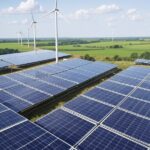Arvind, Peak Sustainability To Build Cotton Stalk Torrefaction Plant In Gujarat
Project aims to replace coal with torrefied biomass in Arvind’s boilers and offer scalable waste-to-energy model for industry
Arvind has partnered with Mumbai-based climate investment firm Peak Sustainability Ventures to develop a large-scale cotton stalk torrefaction plant in Gujarat with a capacity of more than 40,000 tonnes a year, as part of its plan to cut coal use and accelerate decarbonisation.
The project will convert cotton stalk, the woody residue left after cotton is harvested, into torrefied biomass that can act as a cleaner, drop-in substitute for coal in Arvind’s industrial boilers. The company expects the torrefied fuel to replace at least 20 per cent of its coal-based thermal energy needs, with scope to increase substitution over time.
Punit Lalbhai, vice chairman at Arvind , said the company was working across its value chain to meet its Science Based Targets initiative (SBTi) commitments. He described the torrefaction project as one of the strongest circular economy and waste-to-energy models in textiles and “a bold step toward responsible manufacturing at scale”.
Samir Shah, managing partner at Peak Sustainability Ventures, said the partnership was intended to show that waste-to-energy solutions can be economical, circular and catalytic for India’s energy transition. He added that Peak’s mission is to back projects that make a material contribution to India’s sustainability goals by using agricultural residues as clean energy feedstock.
Peak has led the project design by developing the reactor concept, identifying a European technology partner specialising in torrefaction and biochar, and funding the capital expenditure. Arvind’s role includes long-term offtake of torrefied biomass, supply of cotton stalk and integration of the fuel into its own operations as it targets becoming a coal-free company by 2030.
The partners said the plant will also support local livelihoods by creating non-agricultural employment, generating income from crop residues that might otherwise be burnt or left to decay, and potentially feeding back future biochar products to farmers to improve soil health and yields.
India produces more than 500 million tonnes of agricultural waste annually, much of which is discarded or burned. In cotton cultivation, about 15 per cent of the plant is used for fibre and seed, while the remaining 85 per cent typically remains as stalk in the field. Arvind, which works with a network of over 90,000 cotton farmers, already uses cotton stalks for thermal energy but expects torrefaction to significantly improve fuel characteristics by increasing energy density and stability.
Torrefaction is a thermal treatment that can raise the calorific value of biomass by up to 20 per cent and produce a material that closely mimics coal in handling and combustion, allowing up to full replacement in existing boilers without major retrofit. If successful, the model could be scaled to other regions and sectors with access to agricultural residues.
The project has received grant support from the Apparel Impact Institute’s Climate Solutions Portfolio, which backs pilots and scale-up of climate technologies for the textile sector. The institute sees torrefied biomass as a practical interim solution for manufacturers seeking to cut coal use before full electrification of heat processes.
Peak and Arvind said they are in talks with global partners interested in participating in the platform and intend to build a financially viable waste-to-energy business aimed at reducing fossil fuel dependence in Indian industry.




































































































































































































































































































































































































































































































































































































































































































































































































































































































































































































































































































